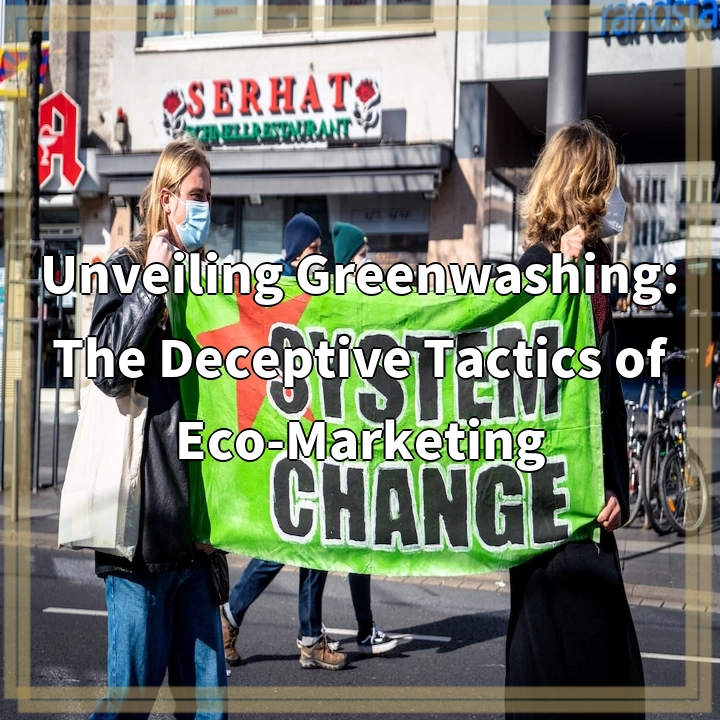
What is Greenwashing?
Greenwashing is a term used to describe the deceptive marketing practices employed by companies to make their products or services appear more environmentally friendly than they actually are. It involves using misleading or exaggerated claims about the environmental benefits of a product or organization, thus misleading consumers into thinking they are making sustainable choices.
Real-World Problems of Greenwashing
Greenwashing poses several significant problems in our society and for the environment. By misleading consumers into purchasing products or supporting organizations that claim to be sustainable but are not, greenwashing erodes trust and undermines the collective efforts to address pressing environmental issues.
One of the major problems with greenwashing is that it misleads consumers who genuinely want to make environmentally-friendly choices. When false claims are made about a product’s eco-friendliness, it becomes challenging for consumers to differentiate between genuinely sustainable options and those engaged in greenwashing practices. This can result in individuals unknowingly supporting environmentally harmful practices and products.
Furthermore, greenwashing can also divert attention and resources away from genuinely sustainable companies and organizations. When companies deceive consumers with false sustainability claims, it creates a distorted marketplace where genuinely eco-conscious businesses may struggle to compete. This can discourage efforts for real change and slow down the transition to a more sustainable economy.
Additionally, greenwashing perpetuates the misconception that addressing environmental issues is primarily about individual consumer choices, rather than focusing on systemic changes. By distracting from larger environmental concerns and diluting the urgency for comprehensive solutions, greenwashing can hinder progress towards sustainability on a global scale.
Overall, greenwashing is a practice that not only misleads consumers but also undermines the collective efforts to address environmental challenges. It compromises the credibility of sustainability claims, inhibits the growth of genuinely sustainable businesses, and diverts attention from the urgent need for systemic change. It is essential for consumers to be aware of greenwashing tactics and advocate for genuine sustainability in both products and organizations.

Solutions to Greenwashing
Addressing greenwashing requires collective action from consumers, regulators, and businesses. By implementing the following solutions, we can reduce the prevalence of deceptive eco-marketing practices and promote genuine sustainability:
1. Consumer Awareness and Education
Empowering consumers with knowledge and awareness is crucial in combating greenwashing. By educating ourselves about sustainability issues, understanding common greenwashing tactics, and learning how to discern genuine eco-friendly products and organizations, we can make informed choices and hold companies accountable for their claims.
2. Transparent and Verified Standards
Developing transparent and verified sustainability standards can help consumers identify trustworthy eco-friendly products and organizations. Establishing independent certification programs and labels, such as Energy Star for energy-efficient appliances or Forest Stewardship Council (FSC) for responsibly sourced wood products, can provide credibility and clarity in the marketplace.
3. Strengthening Regulations
Regulatory bodies play a crucial role in combating greenwashing. Governments should enforce stricter regulations and guidelines to prevent false or exaggerated environmental claims. Robust and transparent monitoring and enforcement can deter companies from engaging in deceptive marketing practices and help foster a level playing field for genuinely sustainable businesses.
4. Corporate Accountability
Businesses need to take responsibility for their sustainability claims and ensure transparency in their practices. Implementing thorough life-cycle assessments, disclosing environmental impacts, and adhering to independent third-party audits can help establish accountability and build trust with consumers. It is essential for companies to align their actions with their sustainability messaging.
5. Collaboration and Industry Standards
Collaboration among companies, industry associations, and experts can drive the development of meaningful sustainability standards and practices. By working together, sharing best practices, and promoting transparency, businesses can collectively raise the bar for sustainability and create a culture of authenticity in the marketplace.
6. Social and Environmental Advocacy
Engaging in social and environmental advocacy is essential in addressing greenwashing at a systemic level. Supporting organizations and initiatives that actively promote sustainability, advocating for stronger regulations, and participating in collective movements can create a demand for genuine sustainability and hold accountable those engaged in greenwashing.
By implementing these solutions, we can minimize the impact of greenwashing, foster genuine sustainability, and contribute to a more sustainable future for our planet.















